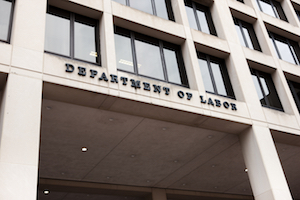 A group of Senate Republicans is unhappy with the Department of Labor’s announcement regarding its enforcement position on the final ESG and proxy voting rules.
A group of Senate Republicans is unhappy with the Department of Labor’s announcement regarding its enforcement position on the final ESG and proxy voting rules.
In a March 18 letter to Al Stewart, Acting Secretary of the Department of Labor, Republican Senators Richard Burr (NC), Mike Crapo (ID) and Pat Toomey (PA) write: “We are concerned by the Department of Labor’s (DOL) March 10, 2021 statement that it will not enforce two important final rules that were issued in 2020 to protect the retirement savings of millions of workers.”
“DOL should immediately reverse its ill-considered decision to not enforce these rules,” they demand, arguing that the DOL has a legal responsibility to enforce ERISA and the rules issued thereunder.
They note that the rules, which amended the Investment Duties regulation under ERISA, “collectively prohibit the fiduciaries of private-sector retirement plans from making investment decisions and exercising shareholder rights in a manner that subordinates the financial interests of workers and retirees to non-pecuniary interests, such as environmental, social, and governance (ESG) objectives.”
The three senators represent the senior Republican leadership on the primary committees with jurisdiction over ERISA and the Department of Labor. Burr is the ranking Republican on the Senate Health, Education, Labor and Pensions Committee; Crapo is the ranking Republican on the Senate Finance Committee; and Toomey is the ranking Republican on the Senate Banking, Housing and Urban Affairs Committee.
Their demand comes following the March 10 enforcement policy statement by the DOL’s Employee Benefits Security Administration announcing that it will not enforce the final rules on Financial Factors in Selecting Plan Investments and Fiduciary Duties Regarding Proxy Voting and Shareholder Rights.
“Until the publication of further guidance, the department will not enforce either final rule or otherwise pursue enforcement actions against any plan fiduciary based on a failure to comply with those final rules with respect to an investment, including a Qualified Default Investment Alternative, or investment course of action or with respect to an exercise of shareholder rights,” the DOL had stated in its announcement.
The senators contend that the DOL’s refusal to enforce these rules “will harm Americans’ retirement savings by allowing plan fiduciaries to sacrifice investment returns to promote non-pecuniary policy objectives like social justice, diversity quotas, and lower carbon emissions.” Moreover, they suggest that the DOL’s decision encourages plan fiduciaries to take actions that may make them vulnerable to class action liability under ERISA.
Citing two articles from The Wall Street Journal, Burr, Crapo and Toomey argue that the DOL’s decision to not enforce the rules is “particularly concerning” because, they note, it reportedly came after Wall Street asset managers lobbied the incoming Biden administration for this outcome and they stand to benefit from DOL’s decision.
The DOL under the Trump administration published a final rule on Financial Factors in Selecting Plan Investments on Nov. 13, 2020, which adopted amendments to the “Investment Duties” regulation under Title I of ERISA. The changes stepped away from using the terms environmental, social and governance (ESG) factors, but instead generally require plan fiduciaries to select investments and investment courses of action based solely on consideration of “pecuniary factors.”
Then, on Dec. 16, 2020, the DOL published a final rule on Fiduciary Duties Regarding Proxy Voting and Shareholder Rights, which also adopted amendments to the Investment Duties regulation to address obligations of plan fiduciaries under ERISA when voting proxies and exercising other shareholder rights in connection with plan investments in shares of stock.
President Biden had signaled even before he was inaugurated that he wanted a review of the financial factors rule in relation to ESG investing. Additionally, the DOL had noted that it heard from a wide variety of stakeholders who have asked whether these two final rules properly reflect the scope of fiduciaries’ duties under ERISA to act prudently and solely in the interest of plan participants and beneficiaries.
Either way, an ongoing policy debate on ESG factors in investing appears to be with us for the next several months. The Securities and Exchange Commission is also undertaking a review of how the Commission can best regulate and guide climate change disclosures, and is seeking comments from the public on whether existing rules should be modified.

